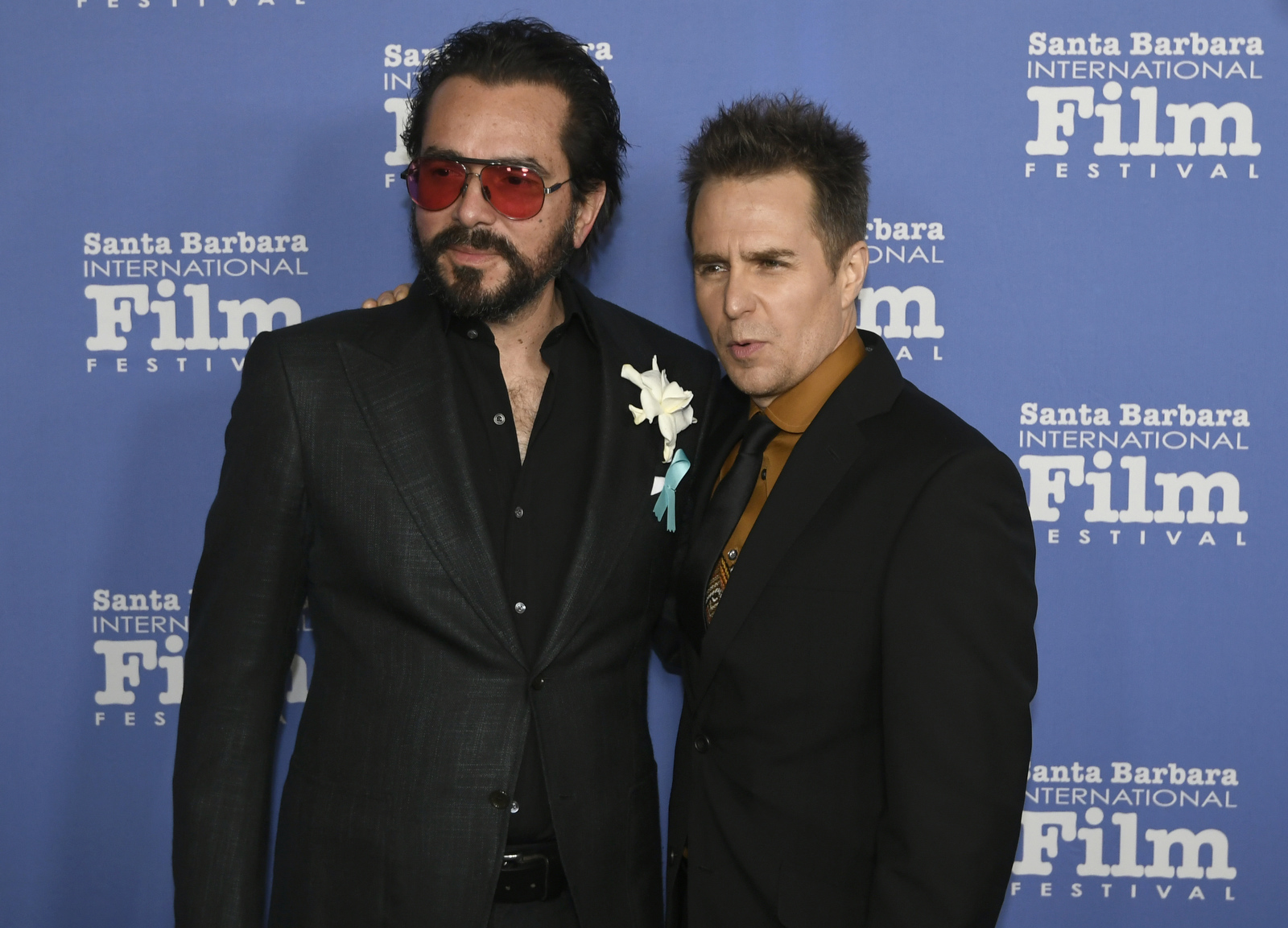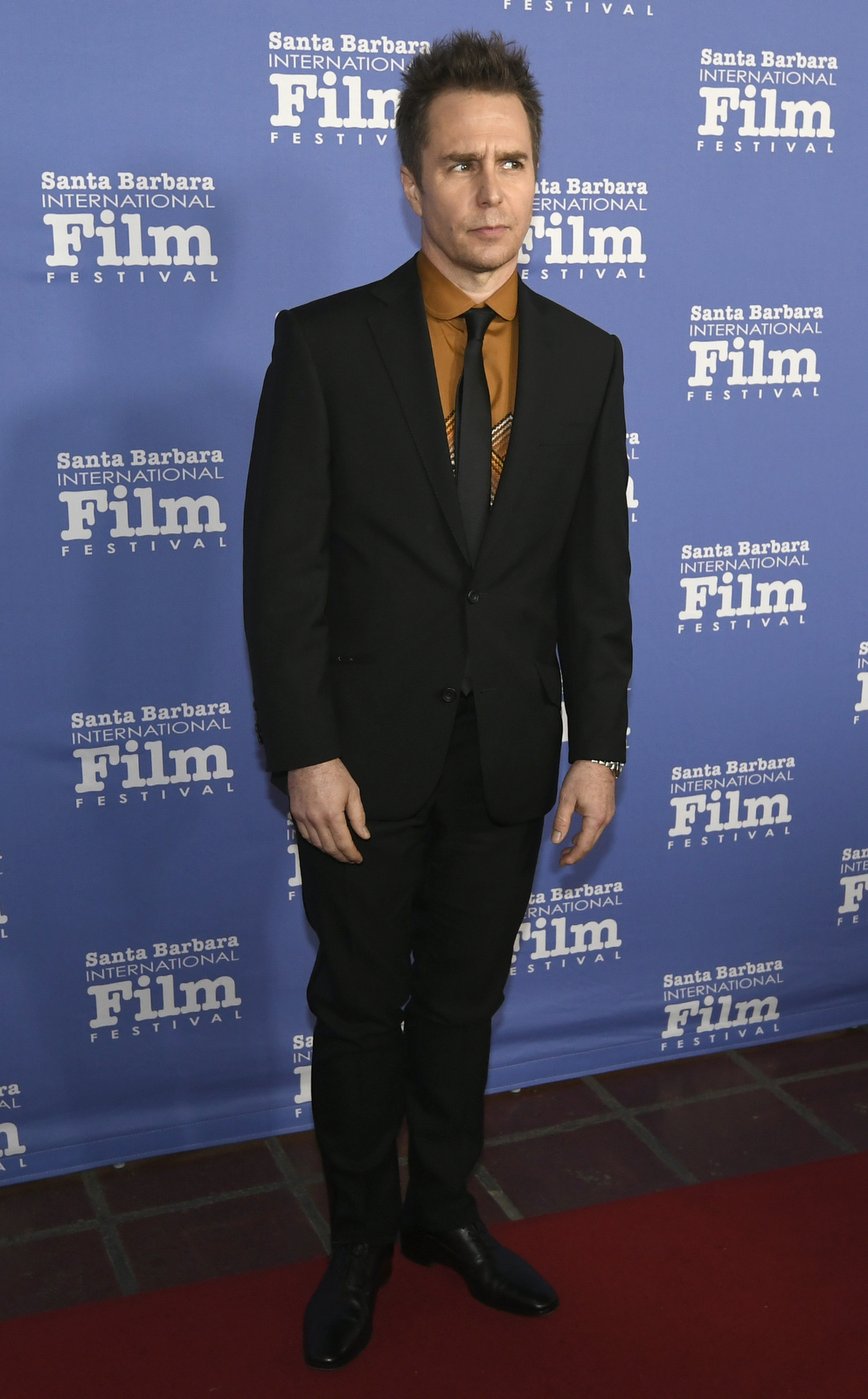SBIFF 2018: Day Eight
Sam Rockwell and Other Actors in Hollywood’s Side Lights

The crop of celebrities honored at this year’s award tributes is low-key, by some standards, in that the klieg lights are being shone on actors who have artistically prospered more or less on the sidelines and in the chameleonic sidelights of Hollywood annals. Over the past week, we’ve seen and heard from Willem Dafoe, Gary Oldman, the young and potently gifted Saoirse Ronan (returning to SBIFF spotlight for the third time, her first in the evening-long tribute forum).
And then there is Sam. Sam Rockwell, that is, the dogged, charming yet elusive actor of three decades’ work, who received the American Riviera award at the Arlington Theatre last night. Rockwell was the comic pattering water park manager in The Way Way Back, the antagonistic brother of Robert Ford in The Assassination of Jesse James, a pulling a double turn as a cloned character in the obscure cult film Moon. He was also a hip cat presence in Seven Psychopaths, a film by Martin McDonagh, the screenwriter/director responsible for creating what has been deemed Rockwell’s finest role, Jason Dixon, in the much-buzzed about Three Billboards Outside Ebbings, Missouri. Not incidentally, the role — written expressly for Rockwell — also earned his first Oscar nomination.

While not a scintillating or very revealing interviewee in the Arlington Theatre, erring on the side of pithy vagueness, Rockwell’s work in a string of film clips spoke for itself. As for his Three Billboards role, he commented, “Martin made a Frankenstein monster part” for him, and that his original vision of the character was “Barney Fife turning into Travis Bickle” expanded to a fuller, and many-angled character.
When asked, “What’s next?” by interviewer Krista Smith, Vanity Fair’s west coast editor, Rockwell pondered for a beat, then flashed his sly grin and said, “Trying to stay young, man.”
As award presenter Clark Gregg (perhaps best known for his role as Agent Colson on Agents of S.H.I.E.L.D.), a longtime friend who first directed Rockwell in the film Choke, said, Rockwell possesses a remarkable gift for making even the sketchiest character likeable.” That is the secret power of the Rockwell touch.
Films to see: On the menu of the “Breakfast Club” screenings on Thursday morning was the fascinating Icelandic film The Swan, given its U.S. Premiere here, and with inspired first-time director Ása Helga Hjörleifsdóttir in the house for a post-screening Q&A. The film follows a young “city” girl’s forced summer in the country that yields a slow-brewing whirlwind of emotional stirrings and detours into the stuff of her own imaginary fictional drifts, dreams, and other poetic turns. All set amidst the stunning, if stark, natural splendor of rural Icelandic landscape. Young actress Grima Valsdóttir gives one of the festival’s more memorable performances in an understated and sometimes symbolism-caked role.
Based on a well-known book by legendary and reclusive Icelandic novelist Guðbergur Bergsson, published in 1991, the film had special meaning for the director, a former literature student who said the book inspired her to pursue film and adapted the screenplay while she was studying film at Columbia University. As she explained in the Q&A, a key challenge was to portray this youthful awakening movie, told largely through the nine-year-old girl’s perspective and dealing with “things she doesn’t fully understand or have access to.”
Bergsson took extreme care in her depiction of a virtual starring character in the film — nature — “which can be a nice backdrop or placeholder” in a film. “I wanted [nature] to be a part of the story engine.” Alluding to Icelanders and other Nordic peoples’ quiet, introverted side, she commented: “There’s this reign of silence and we don’t talk about our emotions very much. Somehow, the nature itself is taking on emotions for us. Nature is speaking for these characters.”
The Swan is a mesmerizing, rough-edged minimalist treat of a film, from a relatively unspoiled and artistically-driven “end of the earth.”
The Syrian crisis has quite rightly filtered into this year’s program, from very different directions. The excellent documentary Sky and Ground puts us literally “on the ground” with a family of Syrian refugees, trudging across Macedonia and a perilous route to safety in Germany.
In Syria, one of the festival’s most popular (and important films) is something else again — it’s an intense account of a long day’s journey in the dangerous night of life in the war torn country, all told through the perspective of one family trapped in their apartment, in a building selectively under attack. Belgian director Phillippe Van Leeuw’s film, which won the Berlin Festival’s Audience Award, manages to create a war/anti-war film with minimal direct violence but the pervasive dread and encroaching chaos in a single location but with multiple threads of dramatic tension. In Syria captures the sense of urban dread and refugee crisis-launching ramifications of the Syrian conflict, but it also serves as a prime example of the resourceful power of compacting a drama into a tight space, with integrated characters filling the screen and our rapt minds. A must-see.
Finale Thumbs Up: Scary Mother is just that…and is also about that. In this stealthy-cool, deceptively slow, and snakily charming film, we are never quite clear if our troubled protagonist — writer/wife/mother (Nato Murvanidze) who seems to be unraveling before us — is actually headed down a rabbit hole of her own madness, or is just besieged by the torment of an artist desperately seeking closure on a book she’s writing. Most of the characters who read it, or parts of it, find it to be “pornography,” while a stationery shop owner/wannabe publisher thinks it a masterpiece.
Director Ana Urushadze cleverly keeps us at arm’s length from his main character and relies on some Hitchcockian ploys to keep the narrative in motion and in mystery. In a way, the enigmatic goings on of plot and character remind us of another maternally monikered film, Darren Aranofksy’s Mother!, which also stirs up matters of family and artistic excess in a strange but compelling brew.
This Estonian/Georgian film is one more on the growing list of Russian/Eastern European films in this year’s SBIFF that have impressed filmgoers as some of the finer goods on the menu. The list so far: the masterful Daybreak, Arrhythmia, The Quartette, and the aptly-named Scary Mother.



